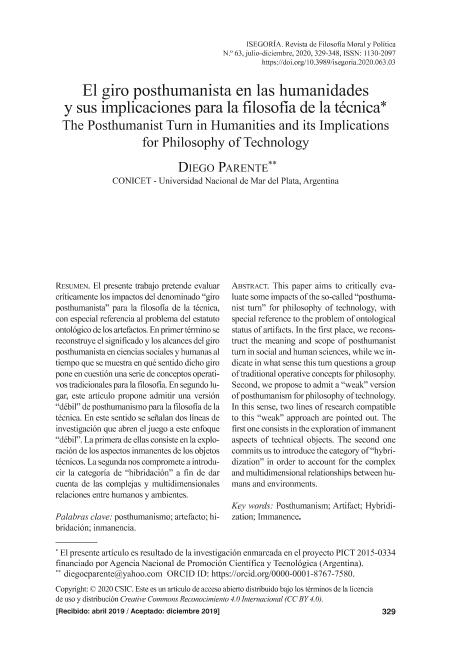Mostrar el registro sencillo del ítem
dc.contributor.author
Parente, Diego Carlos

dc.date.available
2022-09-20T16:25:23Z
dc.date.issued
2020-12
dc.identifier.citation
Parente, Diego Carlos; El giro posthumanista en las humanidades y sus implicaciones para la filosofía de la técnica; Consejo Superior de Investigaciones Científicas. Instituto de Filosofía; Isegoría; 63; 12-2020; 329-348
dc.identifier.issn
1130-2097
dc.identifier.uri
http://hdl.handle.net/11336/169630
dc.description.abstract
El presente trabajo pretende evaluar críticamente los impactos del denominado “giro posthumanista” para la filosofía de la técnica, con especial referencia al problema del estatuto ontológico de los artefactos. En primer término se reconstruye el significado y los alcances del giro posthumanista en ciencias sociales y humanas al tiempo que se muestra en qué sentido dicho giro pone en cuestión una serie de conceptos operativos tradicionales para la filosofía. En segundo lugar, este artículo propone admitir una versión “débil” de posthumanismo para la filosofía de la técnica. En este sentido se señalan dos líneas de investigación que abren el juego a este enfoque “débil”. La primera de ellas consiste en la exploración de los aspectos inmanentes de los objetos técnicos. La segunda nos compromete a introducir la categoría de “hibridación” a fin de dar cuenta de las complejas y multidimensionales relaciones entre humanos y ambientes.
dc.description.abstract
This paper aims to critically evaluate some impacts of the so-called “posthumanist turn” for philosophy of technology, with special reference to the problem of ontological status of artifacts. In the first place, we reconstruct the meaning and scope of posthumanist turn in social and human sciences, while we indicate in what sense this turn questions a group of traditional operative concepts for philosophy. Second, we propose to admit a “weak” version of posthumanism for philosophy of technology. In this sense, two lines of research compatible to this “weak” approach are pointed out. The first one consists in the exploration of immanent aspects of technical objects. The second one commits us to introduce the category of “hybridization” in order to account for the complex and multidimensional relationships between humans and environments.
dc.format
application/pdf
dc.language.iso
spa
dc.publisher
Consejo Superior de Investigaciones Científicas. Instituto de Filosofía
dc.rights
info:eu-repo/semantics/openAccess
dc.rights.uri
https://creativecommons.org/licenses/by/2.5/ar/
dc.subject
ARTIFACT
dc.subject
HYBRIDIZATION
dc.subject
IMMANENCE
dc.subject
POSTHUMANISM
dc.subject.classification
Filosofía, Historia y Filosofía de la Ciencia y la Tecnología

dc.subject.classification
Filosofía, Ética y Religión

dc.subject.classification
HUMANIDADES

dc.title
El giro posthumanista en las humanidades y sus implicaciones para la filosofía de la técnica
dc.title
The posthumanist turn in humanities and its implications for philosophy of technology
dc.type
info:eu-repo/semantics/article
dc.type
info:ar-repo/semantics/artículo
dc.type
info:eu-repo/semantics/publishedVersion
dc.date.updated
2022-09-16T20:46:39Z
dc.identifier.eissn
1988-8376
dc.journal.number
63
dc.journal.pagination
329-348
dc.journal.pais
España

dc.journal.ciudad
Madrid
dc.description.fil
Fil: Parente, Diego Carlos. Consejo Nacional de Investigaciones Científicas y Técnicas. Centro Científico Tecnológico Conicet - Mar del Plata; Argentina. Universidad Nacional de Mar del Plata; Argentina
dc.journal.title
Isegoría
dc.relation.alternativeid
info:eu-repo/semantics/altIdentifier/url/http://isegoria.revistas.csic.es/index.php/isegoria/article/view/1102
dc.relation.alternativeid
info:eu-repo/semantics/altIdentifier/doi/http://dx.doi.org/10.3989/isegoria.2020.063.03
Archivos asociados
